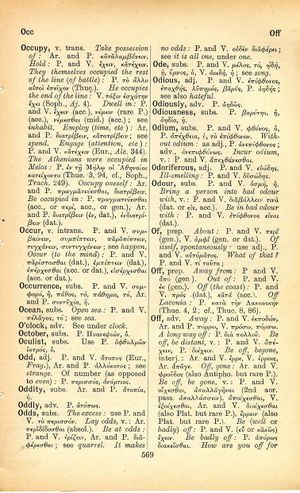off: Difference between revisions
Περὶ τοῦ ἐπέκεινα τοῦ νοῦ κατὰ μὲν νόησιν πολλὰ λέγεται, θεωρεῖται δὲ ἀνοησίᾳ κρείττονι νοήσεως → On the subject of that which is beyond intellect, many statements are made on the basis of intellection, but it may be immediately cognised only by means of a non-intellection superior to intellection
m (Text replacement - "<b class="b2">and</b>" to "and") |
m (Woodhouse1 replacement) |
||
| Line 1: | Line 1: | ||
{{Woodhouse1 | {{Woodhouse1 | ||
|Text=[[File:woodhouse_569.jpg|thumb|link={{filepath:woodhouse_569.jpg}}]] | |Text=[[File:woodhouse_569.jpg|thumb|link={{filepath:woodhouse_569.jpg}}]] | ||
===preposition=== | |||
[[away from]]: [[prose|P.]] and [[verse|V.]] [[ἀπό]] ([[gen]]). | |||
[[out of]]: [[prose|P.]] and [[verse|V.]] ἐκ (gen.). | |||
[[off]] (the [[coast]]): [[prose|P.]] and [[verse|V.]] [[πρός]](dat.), [[κατά]] (acc.). | |||
[[off Laconia]]: [[prose|P.]] [[κατὰ τὴν Λακωνικήν]] ([[Thucydides|Thuc.]] 4, 2; cf., [[Thucydides|Thuc.]] 8, 86). | |||
===adverb=== | |||
[[away]]: [[prose|P.]] and [[verse|V.]] [[ἐκποδών]], [[Aristophanes|Ar.]] and [[prose|P.]] [[πόρρω]], [[verse|V.]] [[πρόσω]], [[πόρσω]]. | |||
[[a long way off]]: [[prose|P.]] [[διὰ πολλοῦ]]. | |||
Of a person, | |||
[[be off]], [[be distant]], v.: [[prose|P.]] and [[verse|V.]] [[ἀπέχειν]], [[prose|P.]] [[διέχειν]]. | |||
[[be off]], [[begone]], interj.: [[Aristophanes|Ar.]] and [[verse|V.]] [[ἔρρε]], [[verse|V.]] [[ἔρροις]], [[Aristophanes|Ar.]] [[ἄπαγε]]. | |||
[[off]], [[gone]]: [[Aristophanes|Ar.]] and [[verse|V.]] [[φροῦδος]] (also Antiphon but rare [[prose|P.]]). | |||
[[be off]], [[be gone]], v.: [[prose|P.]] and [[verse|V.]] [[οἴχεσθαι]], [[ἀπαλλαγῆναι]] (2nd aor. pass. [[ἀπαλλάσσειν]]), [[ἀποίχεσθαι]], [[verse|V.]] [[ἐξοίχεσθαι]], [[Aristophanes|Ar.]] and [[verse|V.]] [[διοίχεσθαι]] (also [[Plato]] but rare [[prose|P.]]), [[ἔρρειν]] (also [[Plato]] But rare [[prose|P.]]). | |||
[[be well off]] or [[be badly off]]: [[prose|P.]] and [[verse|V.]] [[εὖ ἔχειν]] or [[κακῶς ἔχειν]]. | |||
[[be badly off]]: [[prose|P.]] [[ἀπόρως διακεῖσθαι]]. | |||
[[how are you off for friends]]: [[verse|V.]] πῶς δ' εὐμενείας (gen. sing.)… ἔχεις; ([[Euripides|Eur.]], ''[[Helen]]'' 313). | |||
[[come off]], v.: see [[occur]]. | |||
Of a [[person]], [[come off]] ([[better]] or [[worse]]): [[prose|P.]] and [[verse|V.]] [[ἀπαλλάσσειν]]. | |||
[[cut off]]: lit., [[prose|P.]] and [[verse|V.]] [[τέμνειν]], [[κόπτειν]], [[Aristophanes|Ar.]] and [[prose|P.]] [[ἀποτέμνειν]], [[verse|V.]] [[θερίζειν]], [[ἀπαμᾶν]]; see under [[cut]]. | |||
[[intercept]]: [[prose|P.]] [[ἀπολαμβάνειν]], [[διαλαμβάνειν]]. | |||
[[destroy]]: [[prose|P.]] and [[καθαιρεῖν]]; see [[destroy]]. | |||
[[get off]]: see [[escape]]. | |||
[[be acquitted]]: [[prose|P.]] and [[verse|V.]] [[φεύγω]], [[φεύγειν]], [[σώζεσθαι]], [[Aristophanes|Ar.]] and [[prose|P.]] [[ἀποφεύγειν]]. | |||
[[keep off]], [[ward off]]: [[prose|P.]] and [[verse|V.]] [[ἀμύνειν]]; see [[ward off]]. | |||
[[refrain]]: [[prose|P.]] and [[verse|V.]] [[ἀπέχειν]]. | |||
[[lie off]], of a ship: [[prose|P.]] [[ἐφορμεῖν]] (dat.); of an island: [[prose|P.]] [[ἐπικεῖσθαι]] (dat. or absol.). | |||
[[make off]], [[run away]]: [[Aristophanes|Ar.]] and [[prose|P.]] [[ἀποδιδράσκειν]]. | |||
[[put off]], [[defer]]: [[prose|P.]] and [[verse|V.]] [[ἀποτίθεσθαι]], [[εἰς αὖθις ἀναβάλλεσθαι]]; see under [[put]]. | |||
[[take off]] ([[clothes]], etc.): [[prose|P.]] and [[verse|V.]] [[ἐκδύειν]], [[Aristophanes|Ar.]] and [[prose|P.]] [[ἀποδύειν]]. | |||
[[take off from oneself]]: use mid. of verbs given. | |||
[[parody]]: [[Aristophanes|Ar.]] and [[prose|P.]] [[κωμῳδεῖν]] (acc.). | |||
}} | }} | ||
Revision as of 08:45, 20 May 2020
English > Greek (Woodhouse)
preposition
away from: P. and V. ἀπό (gen).
off (the coast): P. and V. πρός(dat.), κατά (acc.).
off Laconia: P. κατὰ τὴν Λακωνικήν (Thuc. 4, 2; cf., Thuc. 8, 86).
adverb
away: P. and V. ἐκποδών, Ar. and P. πόρρω, V. πρόσω, πόρσω.
a long way off: P. διὰ πολλοῦ.
be off, be distant, v.: P. and V. ἀπέχειν, P. διέχειν.
be off, begone, interj.: Ar. and V. ἔρρε, V. ἔρροις, Ar. ἄπαγε.
off, gone: Ar. and V. φροῦδος (also Antiphon but rare P.).
be off, be gone, v.: P. and V. οἴχεσθαι, ἀπαλλαγῆναι (2nd aor. pass. ἀπαλλάσσειν), ἀποίχεσθαι, V. ἐξοίχεσθαι, Ar. and V. διοίχεσθαι (also Plato but rare P.), ἔρρειν (also Plato But rare P.).
be well off or be badly off: P. and V. εὖ ἔχειν or κακῶς ἔχειν.
be badly off: P. ἀπόρως διακεῖσθαι.
how are you off for friends: V. πῶς δ' εὐμενείας (gen. sing.)… ἔχεις; (Eur., Helen 313).
Of a person, come off (better or worse): P. and V. ἀπαλλάσσειν.
cut off: lit., P. and V. τέμνειν, κόπτειν, Ar. and P. ἀποτέμνειν, V. θερίζειν, ἀπαμᾶν; see under cut.
intercept: P. ἀπολαμβάνειν, διαλαμβάνειν.
destroy: P. and καθαιρεῖν; see destroy.
be acquitted: P. and V. φεύγω, φεύγειν, σώζεσθαι, Ar. and P. ἀποφεύγειν.
keep off, ward off: P. and V. ἀμύνειν; see ward off.
lie off, of a ship: P. ἐφορμεῖν (dat.); of an island: P. ἐπικεῖσθαι (dat. or absol.).
make off, run away: Ar. and P. ἀποδιδράσκειν.
put off, defer: P. and V. ἀποτίθεσθαι, εἰς αὖθις ἀναβάλλεσθαι; see under put.
take off (clothes, etc.): P. and V. ἐκδύειν, Ar. and P. ἀποδύειν.
take off from oneself: use mid. of verbs given.

